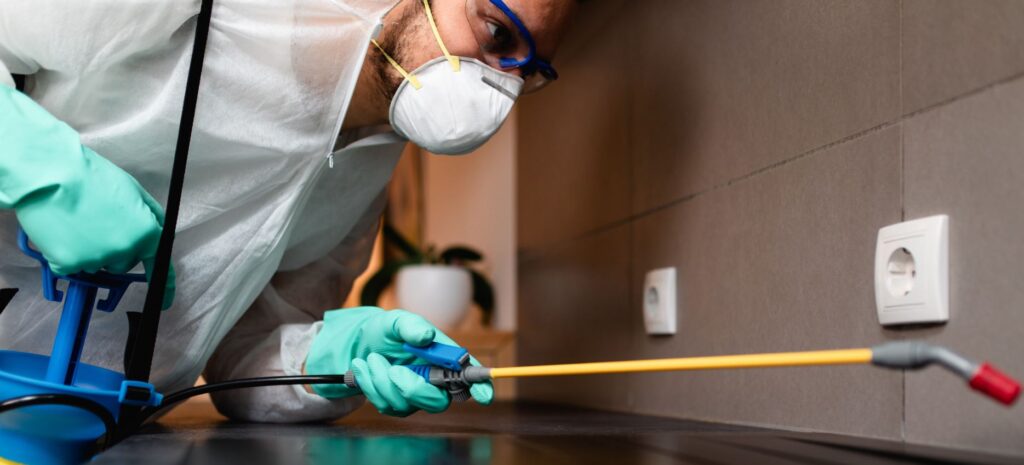Experienced Coquitlam Exterminator for Comprehensive Pest Removal
Experienced Coquitlam Exterminator for Comprehensive Pest Removal
Blog Article
Safe and Reliable Bug Control for Lasting Protection
Efficient bug monitoring calls for a multifaceted method that stabilizes eco-friendly integrity with the requirement for efficient bug reductions. The nuances of these methods might not be instantly clear, triggering a better assessment of the methods that can lead to sustainable pest control results.
Understanding Pest Control Approaches
Bug control includes a range of methods intended at handling and eliminating unwanted pests and rodents that can threaten both wellness and residential or commercial property. Understanding these approaches is critical for efficient insect management.
The key classifications of pest control approaches include mechanical, organic, and chemical techniques. Mechanical methods entail physical barriers and catches to stop insect entry and capture undesirable species. As an example, using displays on windows or using sticky traps can significantly lower insect populaces without introducing unsafe compounds.

Chemical parasite control is frequently the most acknowledged approach, using chemicals to remove insects. These chemicals can be efficient yet need to be used with caution to avoid negative results on non-target species and the setting.
Benefits of Eco-Friendly Solutions
How can environment-friendly remedies change parasite control techniques? The fostering of green pest control methods provides various benefits, considerably boosting the effectiveness and security of parasite management (exterminator coquitlam). These remedies use all-natural active ingredients, minimizing the reliance on hazardous chemicals that can posture risks to human health and the environment. This change not only protects pets and family members yet also minimizes the potential for dirt and water contamination.

Another advantage is the favorable effect on regional biodiversity. Environmentally friendly options are created to target certain parasites while preserving advantageous bugs and wildlife, promoting a balanced ecosystem. This strategy aligns with the expanding customer demand for sustainable methods, boosting the online reputation of pest control carriers.
Integrated Pest Administration Techniques
The execution of environmentally friendly options normally brings about the adoption of Integrated Parasite Monitoring (IPM) techniques, which even more boost insect control effectiveness. IPM is an all natural strategy that incorporates numerous techniques to take care of bug populaces while lessening ecological effect. This technique highlights making use of biological, cultural, mechanical, and chemical controls, guaranteeing a balanced and lasting technique of insect management.
One fundamental facet of IPM is the detailed evaluation of parasite task and environmental problems. By monitoring parasite populaces and identifying their life process, professionals can carry out targeted he said interventions that interfere with the bug's habitat or lifecycle, reducing dependence on chemical pesticides. Furthermore, cultural techniques such as plant rotation and environment control can considerably diminish parasite establishment and reproduction.
An additional important component is making use of biological control agents, such as helpful bugs or microbes, which can naturally suppress bug populations. When chemical applications are needed, IPM prioritizes the usage of low-risk pesticides and uses them selectively, decreasing exposure to non-target microorganisms and people.
Incorporating IPM methods not only enhances pest control efficiency but likewise advertises a much safer ecological community, aligning with the expanding demand for sustainable techniques in insect monitoring.
Safe Practices for Property Owners
Recognizing the importance of risk-free techniques in pest control can equip home owners to efficiently handle parasite problems while securing their wellness and the environment. Carrying out preventative measures and non-toxic techniques is critical in minimizing exposure to dangerous chemicals.
Homeowners ought to first evaluate their environment for conditions that attract pests, such as standing mess, food, and water waste. On a regular basis cleansing and sealing entrance points can deter pests from invading the home. Utilizing all-natural deterrents, such as crucial oils or diatomaceous planet, can supply reliable alternatives to chemical pesticides.
When chemical treatments are necessary, house owners need to go with items that are particularly identified as secure for property use. It is vital to follow application standards thoroughly to avoid too much exposure. Using targeted therapies in areas where parasites are determined, instead than blanket splashing, can substantially reduce chemical usage.
Lastly, preserving open communication with bug control professionals is essential. Property owners need to ask concerning the safety of items used and request eco-friendly choices whenever feasible. By adopting these secure practices, house owners can develop a healthier living atmosphere while effectively handling parasite issues.
Tips for Long-Term Defense
Establishing an insect monitoring strategy that emphasizes long-lasting defense can greatly enhance the efficiency of the secure techniques previously talked about. To accomplish this, home owners should execute routine assessments of their home, concentrating on concealed locations such as attic rooms, cellars, and crawl rooms. Early discovery of pest activity is essential in protecting against infestations from taking hold.
Additionally, maintaining a clean environment is important. This includes proper food storage, quickly cleaning up spills, and regularly taking care of garbage. These practices lower attractants that attract parasites right into the home. Sealing entry factors, such as cracks around doors and home windows, can successfully block possible insect access.
Landscape design needs to also be considered; maintaining plants trimmed and maintaining a range in between greenery and the home minimizes concealing areas for pests. Using natural deterrents, such as essential oils or diatomaceous planet, can even more inhibit invasions without resorting to rough chemicals.
Finally, collaborating with a specialist insect control solution for periodic analyses can offer an added layer of safety. These experts can supply tailored referrals and advanced therapies, making certain that your home stays shielded against bugs in the long term.
Final Thought
In conclusion, risk-free and reliable insect control calls for a multifaceted technique that stresses environment-friendly approaches and integrated bug monitoring. By executing all-natural deterrents, performing regular evaluations, and keeping correct sanitation, property owners can substantially lower parasite populations while safeguarding more helpful pests and the environment. Collaboration with professional insect control solutions boosts the performance of these strategies, guaranteeing tailored services that supply long-term defense and assurance versus future problems.
Efficient bug management needs a multifaceted method that balances eco-friendly integrity with the need for reliable pest reductions. The fostering of environmentally friendly parasite control techniques provides various advantages, considerably improving the visit effectiveness and safety of pest monitoring.The execution of green solutions naturally leads to the adoption of Integrated Insect Monitoring (IPM) strategies, which better enhance pest control effectiveness. exterminator coquitlam. By keeping an eye on bug populations and determining their life cycles, specialists can carry out targeted treatments that interrupt the insect's environment or lifecycle, decreasing reliance on chemical pesticides.In verdict, risk-free and reputable parasite control needs a multifaceted strategy that highlights environmentally friendly methods and incorporated pest monitoring
Report this page